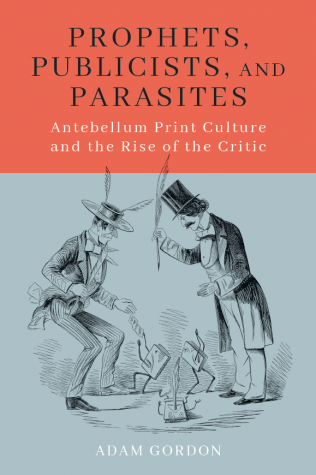Q&A with Professor of English Adam Gordon: Chronicling the rise of literary criticism
November 12, 2020

Adam Gordon is an associate professor of English at Whitman College, who has been published in a variety of journals. His first book, Prophets, Publicists and Parasites: Antebellum Print Culture and the Rise of the Critic, which discusses literary criticism and its growth and change, was published by the University of Massachusetts Press in February of 2020.
Jaime Fields: Could you tell me a little about yourself?
Professor Adam Gordon: I teach in the English department; specifically I teach early and 19th century American Literature… This is my 8th year [at Whitman]. I am from Massachusetts, I went to my undergrad at the University of Pennsylvania, and then I did my PhD at UCLA, and then had a postdoc and spent that time working turning my dissertation into what is now my book. Then after a year of my postdoc, I landed at Whitman.
JF: Could you tell me about your book?
AG: So it started as my dissertation when I was at UCLA — well actually I mean you could trace back even further. When I was an undergrad I wrote my thesis on Edgar Allan Poe and the one novel that he wrote… then when I was in grad school I returned to Poe for the first chapter of what became my dissertation.
I’m sure you’ve probably read something by Poe — his poetry, or some of his short stories. Actually in his own life he was perhaps most famous, if not notorious, for his career as a critic. He wrote over a thousand reviews. He was, you could say dramatic, but maybe a more honest way to say it would be a really mean critic… So I started with this chapter on Poe as a critic, and the contradictions that I saw in looking at a tension between the literary work that he was producing and the critical work that he was producing.
This was the first article that I ever wrote, but it was basically about how Poe was a self-hating critic—he was perfectly happy to write criticism of other people, he insisted that American literature, to get any better, needed fearless, honest critics, but when it came to his own work he felt that criticism was superfluous, it was apart from the true aim of literature.

This was the germ of my project — trying to think about what was it in the critical culture of the time that had Poe so divided and conflicted in his understanding of literary criticism, what it was good for, why people should read it and ultimately whether it’s necessary at all. That is the broader subject of the book, which is called Prophets, Publicists and Parasites: Antebellum Print Culture and the Rise of the Critic. It’s about the growth of the American critical institution in the first half of the 19th century.
Part of the way I come at it that’s a little bit different from other people, is [that] I’m interested in the variety of different forms that criticism takes and what those forms tell us about how people use criticism. So the kind of the largest methodological argument of the book is that literary criticism serves a lot of different purposes in our lives, some that we may be aware of, others that we may not fully, and that to kind of recuperate the variety of those uses we need to be more aware of the different [forms] that literary criticism takes.
The first chapter is about Ralph Waldo Emerson and Quarterly Reviews… and one of the things I argue is that Emerson relied heavily on reviews in these journals to get summaries of intellectual movements that were going on… My second is on the first professional anthologist, a man named Rufus Griswold, the first person to kind of produce these best-selling anthologies of American poetry and prose, and it’s about the anthology as a site of literary history.
Chapter 3, I told you a little bit about, is about Poe as a kind of a self-hating critic… [and] about the review as a form of entertainment in its own right and Poe’s discomfort with that. Chapter 4 is about this woman named Margaret Fuller, one of the most important 19th century American feminists… She brought book reviewing from a more intellectual context to the front page of the newspaper… making literary criticism something that everyone could read.
The final chapter is on reviews of Uncle Tom’s Cabin, which was the bestselling novel of the American 19th century and obviously also a very volatile novel. So it’s about a very strange form of criticism — it’s about reprinted reviews… reviews that have been taken from one place and repurposed somewhere else.
Then I end in a coda, talking about where we are now and talking about Amazon reviews and critical amalgamators like Rotten Tomatoes and what criticism is right now… Part of the reason I focus on the early 19th century is because it was a moment of technological transformation, much like our own moment.
JF: So could you tell me a little bit about what your process was like in writing this book?
AG: It was long. It started in grad school, and I wrote a long unwieldy dissertation — no-one should write a dissertation as long as I wrote. It was like 500 pages, [and] it had these 100-page chapters… that’s how I write, unfortunately.
So I had this dissertation and I ended up getting a postdoctoral fellowship, which in the humanities is basically a year out of a famous research archive where you have access to materials that help you flesh out the archival basis for your project. So… I went to this place called the American Antiquarian Society and… I spent a year reworking the conceptual framework of the project… so there was a long period of both revision but also using materials that I now had access to build up the foundation of it.
Once I got to Whitman, I continued to write and revise and then I started shopping for a publisher and when you shop for a publisher part of their process is once they kind of say that we like this book we’re interested in it they send it out to peer reviewers and so you know I also when I got my peer reviews back I also responded to that criticism, in some cases in substantial ways.
It did change in significant ways… so it reflects kind of an evolution of my thinking… by the end of the process, I was a stronger writer… it’s kind of crazy to look at it now and think like this is ten years of my life that’s probably going to get dusty on a library shelf somewhere but it’s also exciting because it’s you’re adding something permanent to the world.
Now, this also is a continued part of the process, when it comes out… you just need to have the book find it’s readers… [But] I just heard… that my book was just reviewed by Choice, which is the magazine that tells libraries what to buy and they reviewed it well… and I just read another review a week or two ago from Poe Studies that had a nice review of the book, so it’s a book about reviews that are now getting some reviews.
JF: I’m glad they’re reviewing it well! Have you been published before this?
AG: This is my first book… I have four or five articles in a bunch of different scholarly journals; I also have a piece in an edited collection and another piece coming out in another edited collection so I’ve had scholarly publication… but I was also very committed to also doing a book.
One thing that is nice about Whitman is even though it’s a small liberal arts college, they really support scholarship… I couldn’t have finished this if not for the fact that Whitman has a structure for supporting the faculty that they hire. I’m thankful to my students also—it’s nice to… get all of this intellectual feedback from these smart people.
JF: For sure. Was there anything else you wanted to tell me about your book or your work or your process?
AG: It’s an ugly process… I always tell my students to be self-aware about your own process and identify what your strengths are [and] identify where you could improve, and having written one book, I know how I would do things differently if I wrote another. [But] I’m excited to have it out, I’m excited to have people start reading it, [and] I’m excited to also move on to new subjects.




